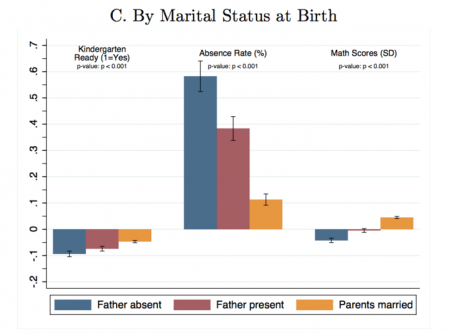
Over at National Review, Professor Bradford Wilcox says it’s been a rough week for family structure denialists:
It’s been a rough two weeks for the family-structure denialists, those progressive academics (Philip Cohen, “How to Live in a World Where Marriage Is in Decline”), journalists (Katie Roiphe, “New York Times, Stop Moralizing About Single Mothers”), and pundits (Matthew Yglesias, “The ‘Decline’ of Marriage Isn’t a Problem”) who seek to minimize or deny the importance of marriage and family structure. That’s because three new pieces of scholarship — a journal, a report, and a study — were released this month that solidify the growing scientific consensus that marriage and family structure matter for children, families, and the nation as a whole.
On October 14, Princeton University and Brookings released a new issue of The Future of Children, focused on marriage and child well-being. After reviewing family research over the last decade, the issue’s big takeaway, co-authored by Princeton sociologist Sara McLanahan and Brookings economist Isabel Sawhill, was this:
Whereas most scholars now agree that children raised by two biological parents in a stable marriage do better than children in other family forms across a wide range of outcomes, there is less consensus about why. Is it the quality of parenting? Is it the availability of additional resources (time and money)? Or is it just that married parents have different attributes than those who aren’t married? Thus a major theme we address in this issue is why marriage matters for child wellbeing. Although definitive answers to these questions continue to elude the research community, we’ve seen a growing appreciation of how these factors interact, and all of them appear to be involved.
In other words, although scholars are not exactly sure why marriage matters for children, they know that marriage does matter for them.
On Tuesday, the Washington Post spotlighted a new report, Strong Families, Prosperous States: Do Healthy Families Affect the Wealth of States?, that highlights the macroeconomic associations between marriage and state economies. The report, which I co-authored with economists Robert Lerman and Joseph Price for the American Enterprise Institute and the Institute for Family Studies, shows that states with higher levels of married parenthood enjoy higher levels of growth, economic mobility for children growing up poor, and median family income, along with markedly lower levels of child poverty.
[…]
Be sure to read the full article at National Review.
Maggie Gallagher is a senior fellow at the American Principles Project.


